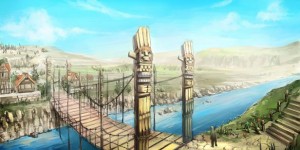 I’ve been steadily expanding my campaign setting “The Isles” for years. Most recently, I’ve been filling in basic descriptions of places which were nothing more than names on a map. Here’s a technique I’ve developed for generating ideas (when I don’t already have an idea in mind) for a particular settlement.
I’ve been steadily expanding my campaign setting “The Isles” for years. Most recently, I’ve been filling in basic descriptions of places which were nothing more than names on a map. Here’s a technique I’ve developed for generating ideas (when I don’t already have an idea in mind) for a particular settlement.
I look at the place on my map and think about the local geography. This helps me focus on the most likely range of possibilities for this place. Obviously, a town in the middle of a barren desert will be inherently different from one on the side of a lush mountain, or in a valley next to a river, or in the middle of a rain forest, or on the shores of an ocean…
Then I go to Google maps and pick a spot roughly similar to the place I’m trying to write about, zooming in until I can see most place names – halfway to 2/3’s up the “zoom bar” seems to work for me. I’m not looking for the tiniest hamlets with just 100 people, but I don’t want to look at only cities of several million people either. Now I slowly wander about the map until a place catches my eye. It could be the name, location, or whatever. Sometimes switching back and forth between map, satellite and terrain views helps also.
Once I’ve selected a place name, I look it up in Wikipedia. Sometimes there’s no info, so go back to Google maps and pick another town. Once you have an article of a page or so, read through it and look for any ideas that jump out at you. You’re looking for things that are interesting or odd. Does the town have a wierd history? What businesses or industries are (or were) there? What customs of events take place there? Any notable personages?
Once I’ve picked two or three inspirations from the article, I go back to my campaign map. Armed with these seed ideas, I think about where the campaign town is, how it relates to the other towns nearby, what the regional politics culture or is like (etc.), and see how I could adapt my ideas to fit into this settlement. It doesn’t matter if you use the seed ideas verbatim or if you radically alter them to suit your town/village/city. The objective is to get three or four paragraphs of useful text.
One important consideration is the usefulness to adventuring that this town can have. Now I don’t mean that every hamlet needs to have a ready-made adventure built in, but you should have a few hooks that could be turned into an adventure, or connected up with any existing plots in your campaign. Sometimes it only takes a small thing to accomplish this. Perhaps the mayor is related to a prominent religious leader of the nation? Is there a valuable resource, import or export there? Maybe they have a bandit problem? Maybe the inhabitants hold an interesting annual festival. Almost anything can be a jumping off point for an adventure.
A final warning. Unless your party is currently in, or about to adventure in a given location, resist the urge to create massive amounts of setting notes. You’re only looking to create an overview of the town in question, not fully detail it. If you’re approaching half a page of text, you’ve gone too far! Stop writing and move on to the next undescribed town!

Using Wikipedia seems…. pretty cool. I’m going to have to try that.